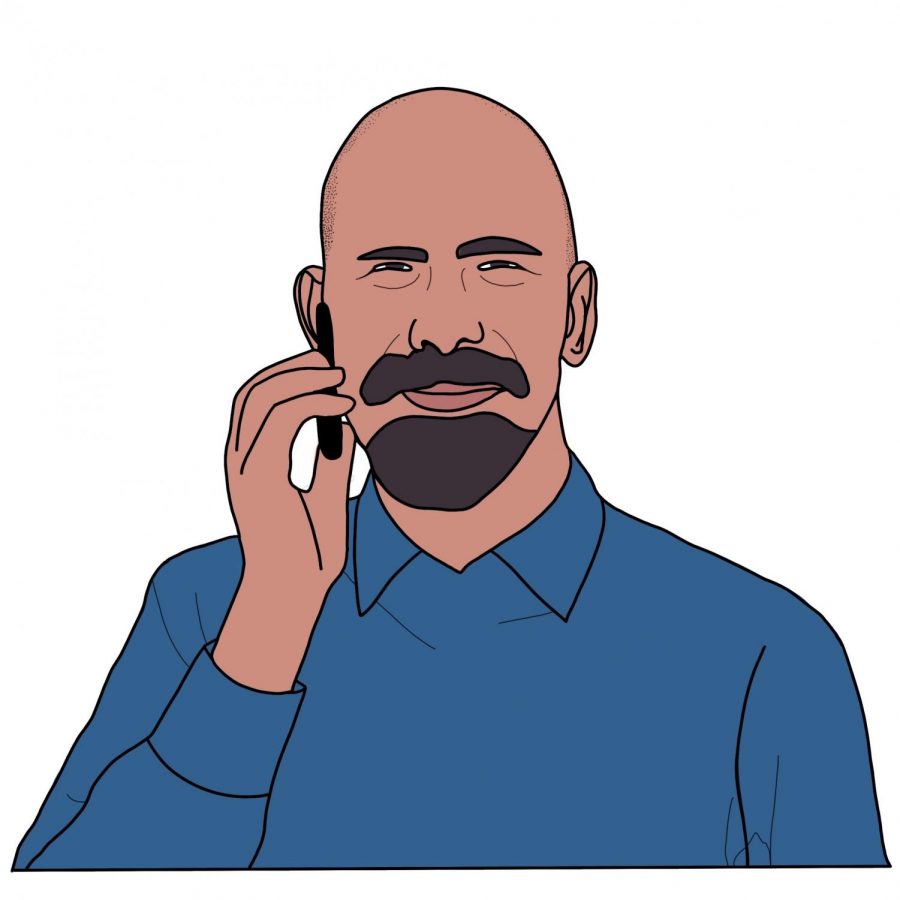Counseling on call
Distance learning greatly changes the school counselors’ jobs
Distance learning has not only drastically changed the way students attend school and connect with others, but it has also greatly altered the way the counselors do their jobs, which formerly included a lot of “interaction.”
Counselor Arond Schonberg believes he has “adapted well” to working online by going back to the “old school” method and doing check-in calls with each of his students every single month.
“My main motivation for doing these calls with students is to establish rapport, connection and support that will endure throughout their high school experience,” Schonberg said.
Schonberg hopes that by checking-in like this with his students, which he has been doing monthly since the initial school closure last March, he can be “preventative” with any issues that may arise.
“If I check in with you often, problems don’t get so out of control, and we keep the challenge or situation manageable,” Schonberg said. “If we don’t talk often, then an issue just gets too out of control.”
The calls, which last around three to five minutes, allow students to voice their thoughts and feelings about their academics and social or emotional health.
For these check-ins, Schonberg uses an app called Google Voice and goes alphabetically starting at the letter Q, since he is a counselor for those with the last name Q-St, calling the 9th graders first using their parents’ phone numbers listed in PowerSchool. He makes sure to document all the phone calls in a little notebook as well as in PowerSchool.
By staying organized, Schonberg can recall previous conversations with each student when he calls them the next month.
“Keeping track of information benefits me because I see patterns and themes throughout the year and it allows me to be proactive with my interactions with students and their families and address their needs,” Schonberg said. “Instead of catching up, we are perpetually moving forward and looking at the student’s progress.”
Schonberg being able to call the students individually using their parents’ numbers also makes the parents aware that he is checking in with students, which he believes is another “advantage” of the calls.
Schonberg, who views himself more as an academic support coach, additionally makes calls to check in with the parents, in which he makes them more aware of their student’s situation and coaches them to look at things from a “different perspective.”
“I prime them to look at what they are doing to be successful and how they are doing that and use those strategies to improve,” Schonberg said. “I encourage parents, especially, to see progress of students, no matter how small, because that changes how they interact and approach their students about school.”
Schonberg also believes that it’s worth taking the time to see how his students are doing and sees the importance in making sure that everyone is working as a team.
“Time is something you can’t get back, so it’s the most valuable commodity,” Schonberg said. “If I invest my time into connecting with students and developing relationships, students and their families appreciate the effort and are more susceptible to my approach.”
Aside from checking in through calls, he regularly sends emails to students asking if they need anything or have any questions, though he still misses the face-to-face interaction provided to him from in-school counseling.
Schonberg is not the only one who misses in-person counseling, though. Counselor Denise Holmes believes that while she has adjusted to counseling during virtual learning, it’s not the “preferred circumstance” as there is still much separation between students and counselors.
“I would say the challenge is simply missing the interaction. It’s more challenging to communicate with the students and parents,” Holmes said. “Being behind a screen is the closest you get to connecting and interacting.”
To keep in contact with individuals, Holmes sends emails to students on her caseload. She also reaches out to some individually regarding challenges with motivation and social isolation that impact their academics and overall functioning.
“I’ll reach out to students who either seem to have decreased in grades or who have issues reported by their teachers,” Holmes said. “Some students, who I really appreciate, will actually reach out and let us know how they’re doing. I do really appreciate any feedback that we get from students proactively to let us know how we can support them better too.”
Aside from email being a good way to keep in touch with Holmes and other counselors, a new program called Calendly will soon be introduced by the counseling team.
“[We are] working towards streamlining the communication between students and counselors, and the process for requesting meeting times with counselors,” Holmes said.
According to Holmes, this will make communication more “efficient” and “easier” since students will be able to ask for an appointment without having to explain the whole background or reason of wanting to meet with their counselor.
Counselors have already let some of their students know about Calendly, but more information about this new counseling addition will be released in the near future through updated links and details on the RUHS website as well as in upcoming emails.
With now another way to meet with a counselor, students can find “support” through working jointly with their counselors during such an uncertain and isolating time.
“We’re here to support students and we totally understand so many of the challenges that they have,” Holmes said. “The best way is that we all get through this together.”




